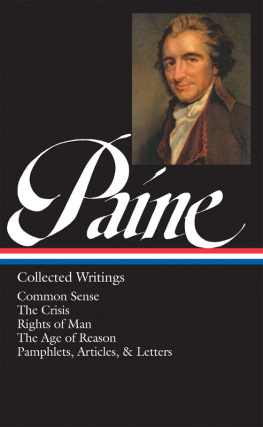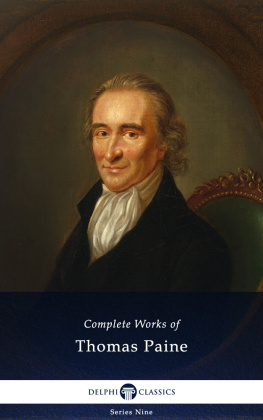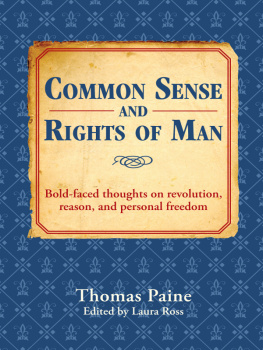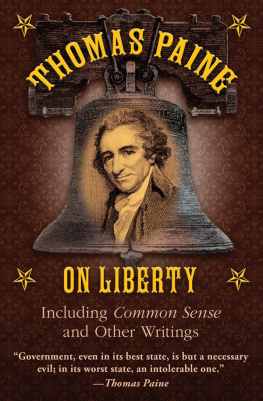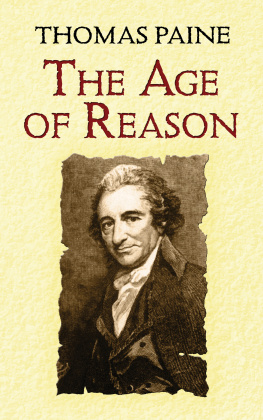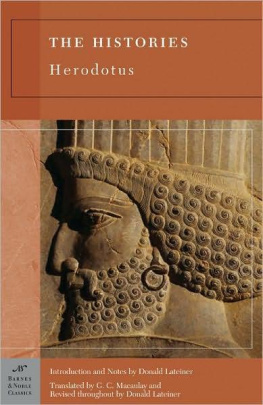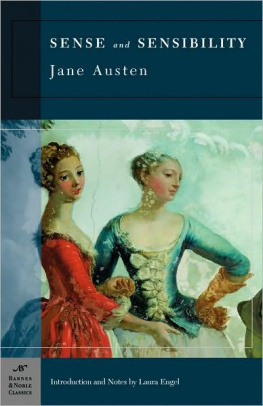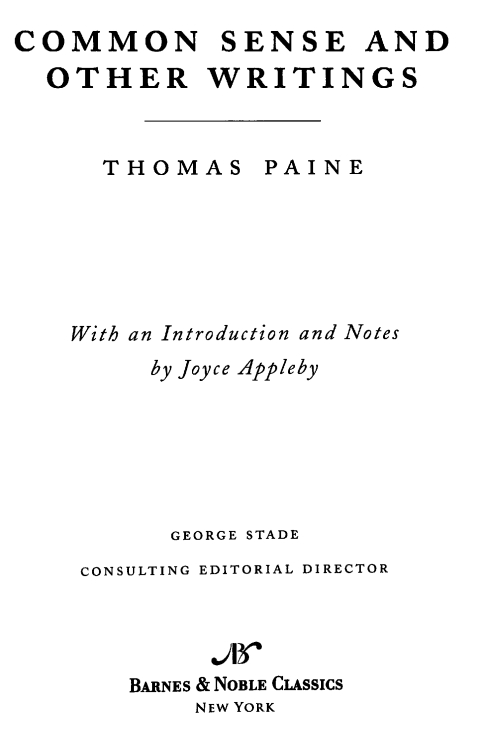
Table of Contents
List of Tables
FROM THE PAGES OF
COMMON SENSE AND OTHER WRITINGS
That some desperate wretches should be willing to steal and enslave men by violence and murder for gain, is rather lamentable than strange. (from African Slavery in America, page 5)
Society is produced by our wants, and government by our wickedness. (from Common Sense, page 17)
There is another and greater distinction for which no truly natural or religious reason can be assigned, and that is the distinction of men into KINGS and SUBJECTS. Male and female are the distinctions of nature, good and bad the distinctions of Heaven; but how a race of men came into the world so exalted above the rest, and distinguished like some new species, is worth inquiring into, and whether they are the means of happiness or of misery to mankind.
(from Common Sense, pages 22-23)
When we are planning for posterity, we ought to remember that virtue is not hereditary. (from Common Sense, page 54)
These are the times that try mens souls.
(from The Crisis, page 73)
Tyranny, like hell, is not easily conquered; yet we have this consolation with us, that the harder the conflict, the more glorious the triumph. What we obtain too cheap, we esteem too lightly: it is dearness only that gives every thing its value.
(from The Crisis, page 73)
Every child born into the world must be considered as deriving its existence from God. The world is as new to him as it was to the first man that existed, and his natural right in it is of the same kind.
(from Rights of Man, page 128)
When it is laid down as a maxim, that a King can do no wrong, it places him in a state of similar security with that of ideots and persons insane, and responsibility is out of the question with respect to himself. (from Rights of Man, page 164)
All national institutions of churches, whether Jewish, Christian, or Turkish, appear to me no other than human inventions set up to terrify and enslave mankind, and monopolize power and profit.
(from The Age of Reason, page 258)
When authors and critics talk of the sublime, they see not how nearly it borders on the ridiculous.
(from The Age of Reason, page 319)
The present state of civilization is as odious as it is unjust. It is absolutely the opposite of what it should be, and it is necessary that a revolution should be made in it. The contrast of affluence and wretchedness continually meeting and offending the eye, is like dead and living bodies chained together.
(from Agrarian Justice, page 339)
As laws may be bad as well as good, an empire of laws may be the best of all governments or the worst of all tyrannies.
(from Letters to American Citizens, page 352)
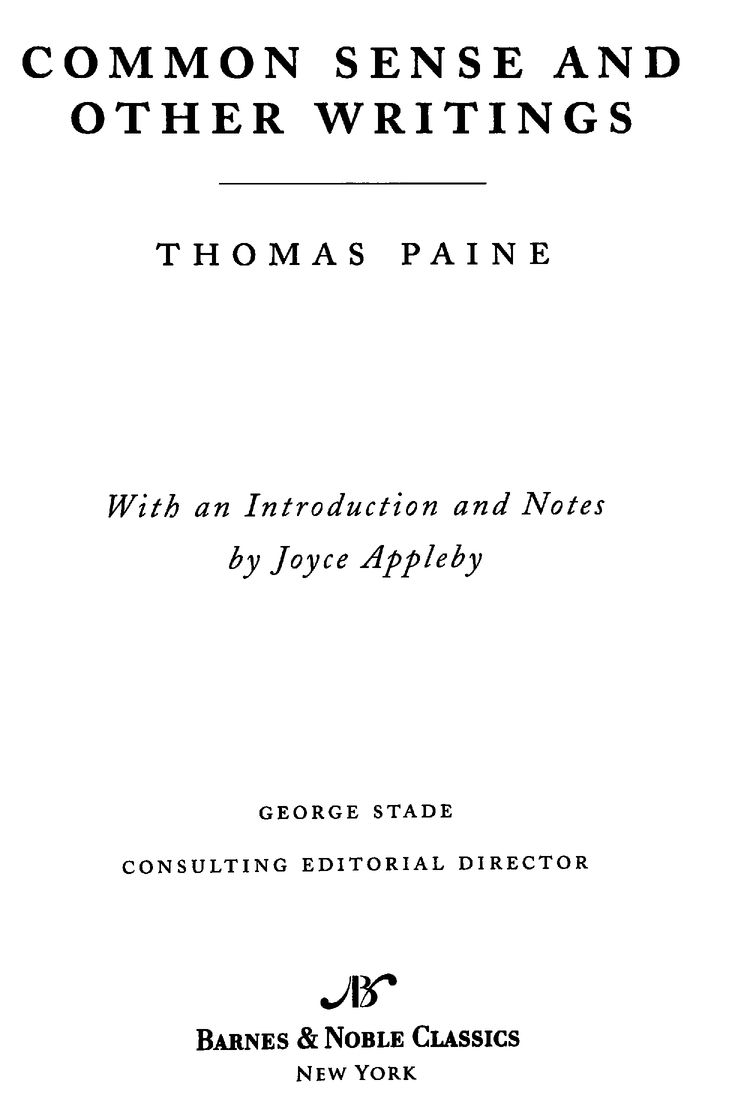
THOMAS PAINE
Thomas Paine was born in the village of Thetford in Norfolk, England, on January 29, 1737, the son of Joseph Pain, a Quaker who made stays for womens corsets, and Frances Cocke, the daughter of a lawyer. Tom attended the village grammar school, where he showed an early talent for poetry, mathematics, and the natural sciences. At age thirteen he was put to work as an apprentice to his father. Upon the outbreak of the Seven Years War with France in 1756, he ran off to sea, enlisting as a crewman on a privateer; his father stopped him from boarding that ship, but he served as a crewman on another for six months, returning to England in August 1757. While in London he pursued his interest in natural science, attending lectures at the Royal Society.
Paine returned to staymaking, first in Dover, then, in 1759, setting up his own business in Sandwich, Kent. Subsequently he secured a position as an excise officer in Lincolnshire, collecting taxes from merchants and smugglers, but was discharged in 1765. He returned to staymaking again briefly, then in 1766 took a teaching position in London for a few months. In May of that year he was readmitted into the Excise Service and in early 1768 was appointed as an excise officer at Lewes, Sussex, where he remained for the next six years. He found his political voice as a representative for his fellow excise officers in their petition to Parliament for better wages, writing The Case of the Officers of Excise (1772); he spent several months in London distributing copies of his pamphlet, to no avail. During his time there he was admitted into a distinguished circle of intellectuals and political thinkers that included English historian Edward Gibbon and Benjamin Franklin, Americas colonial agent for Pennsylvania.
In 1774 Paine was again dismissed from the excise service. At age thirty-seven, he had failed at every enterprise and was virtually penniless. At Franklins urging, and with his letter of recommendation, Paine immigrated to Philadelphia in the fall of 1774. Arriving in the thick of political tumult, he found work as an editor at the Pennsylvania Magazine and wrote articles condemning British tyranny. Impassioned by the revolutionary zeal around him and the outbreak of war, Paine published Common Sense in January 1776 to enormous popularity. The pamphlets clear and powerful argument for American independence from Great Britain sounded the revolutionary call as the voice of the common citizen. He followed with the first of his American Crisis Papers (1776-1783). These are the times that try mens souls, he began, in an address so inspiring that General George Washington had it read to his troops. But Paine was not merely a propagandist; his articles were brilliantly reasoned, and he gained the ear of the Revolutionary leadership. A prolific writer, he published influential essays on political theory, the war effort, foreign affairs, taxes, and monetary policy. His influence grew as the war progressed, and he was rewarded upon victory with secretarial posts in the new government.
In 1787 Paine traveled to Europe, sometimes acting as an unofficial envoy of the American government. The bloody outbreak of the French Revolution in 1789 shocked the monarchy and many progressive reformers in Britain, but Paine vigorously defended it. In 1791 he published the first part of Rights of Man (the second appeared in 1792), articulating the political necessity of the revolution in France and calling for the English to establish a constitutional democracy. The pamphlet was wildly successful; in response, in May 1792 the English government charged Paine with seditious libel and issued a warrant for his arrest. Before his case came to trial Paine left for France, never to return to England, where he was tried and convicted of treason in absentia.
Paine was made an honorary delegate to the National Convention and helped frame a new French constitution. He did not escape the Reign of Terror led by Maximilien Robespierre; in 1793 Paine was arrested as an enemy of France and sentenced to death. Shortly before his imprisonment, he finished writing the first part of The Age of Reason (1794), an essay attacking organized religion and the Bible. He spent ten months in prison until James Monroe, the American minister to France, secured his release in late 1794. Seriously ill, he stayed at Monroes home to recuperate and finished writing the second part of The Age of Reason (1796).
Paine remained in France for seven more years, fearing arrest or seizure should he attempt a return to England or America. In 1797 he published his last major work,
Next page

